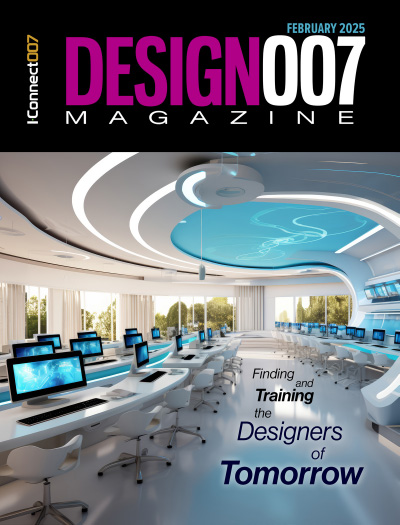-

- News
- Books
Featured Books
- design007 Magazine
Latest Issues
Current Issue
Designing Through the Noise
Our experts discuss the constantly evolving world of RF design, including the many tradeoffs, material considerations, and design tips and techniques that designers and design engineers need to know to succeed in this high-frequency realm.

Learning to Speak ‘Fab’
Our expert contributors clear up many of the miscommunication problems between PCB designers and their fab and assembly stakeholders. As you will see, a little extra planning early in the design cycle can go a long way toward maintaining open lines of communication with the fab and assembly folks.

Training New Designers
Where will we find the next generation of PCB designers and design engineers? Once we locate them, how will we train and educate them? What will PCB designers of the future need to master to deal with tomorrow’s technology?
- Articles
- Columns
Search Console
- Links
- Media kit
||| MENU - design007 Magazine
Estimated reading time: 5 minutes
It’s Only Common Sense: Being Your Customer’s Expert—The Key to Consultative Sales
With successful sales, one phrase remains true: "Be your customer’s expert." Gone are the days of transactional sales where the buyer knows what they want, and your job is to provide it. Today, successful salespeople position themselves as trusted consultants, advisors, and experts. The key lies in mastering the art of consultative sales. Here’s what that means and how to adopt these principles to transform your sales approach and build long-term, fruitful relationships.
1. Understand Their Needs Better Than Them
The cornerstone of consultative sales is understanding your customer’s needs. This goes beyond price and lead time. It’s about uncovering their pain points and challenges.
- Start by asking open-ended, probing questions:
- What are your biggest challenges right now?
- What’s preventing you from achieving your goals?
If you could wave a magic wand, what would your ideal solution look like?
These questions show that you care and help you uncover insights that the customer might not even be aware of. Your goal is to have the customer think, "Wow, they get me."
Always document and analyze these conversations. Use a CRM or a notebook to track recurring themes. These insights can guide your approach with all customer bases.
2. Know Your Stuff (and Theirs)
To be an expert, you must know your product or service inside out, but you also need to understand your customer’s business and industry.
- Study their market: What trends, challenges, and innovations are shaping their industry?
- Learn their business model: How do they make money, and where do they face operational bottlenecks?
- Understand their end customers: Who are they serving, and what are those customers’ expectations?
By combining your technical expertise with an understanding of your customer’s world, you become indispensable.
Keep learning. Attend industry conferences, webinars, and training sessions. The more you know, the more valuable you become.
3. Offer Solutions, Not Products
This means framing what you sell in terms of the problems they solve and the value they deliver. For example, instead of saying, "This PCB has a higher layer count and tighter tolerances," you might say, "This PCB design will help you reduce weight and improve performance in your aerospace application."
The best salespeople offer customized solutions. Maybe your customer needs design advice to improve manufacturability, or they’re struggling with tight deadlines and need expedited service. Identify those needs and craft tailored solutions. Suggest alternative approaches, even if they don’t directly benefit your bottom line in the short term. Customers remember and appreciate honesty and creativity.
4. Educate and Empower Your Customers
When you share knowledge that helps your customers make better decisions, they see you as a trusted advisor rather than a mere salesperson.
Consider offering:
- Workshops or webinars on industry trends or best practices
- White papers or case studies that illustrate successful projects like theirs
- Design guides to help them avoid common pitfalls
When you empower your customers with knowledge, you build trust and demonstrate your commitment to their success.
Tailor your educational content to different levels of expertise. The engineer designing the product will need different insights from the procurement manager placing the order.
5. Be Proactive, Not Reactive
A consultant doesn’t wait for problems to arise; they anticipate them. For example:
- If you know a customer’s lead times are tight, suggest stocking programs or expedited options before they ask
- If a new regulation or standard is affecting their industry, discuss how it might impact their operations
- If you see where they can improve their processes or products, mention it, even if it means more work for you
Being proactive demonstrates that you’re not simply selling, you’re invested in their success.
Schedule regular check-ins with your key accounts. Even if there’s no immediate project, staying in touch keeps you at the forefront of their minds.
6. Build Long-Term Relationships
Consultative sales aren’t about closing a single deal, they’re about building partnerships. Customers who see you as a valuable consultant are more likely to return and refer you to others. To foster long-term relationships:
- Be reliable: Always deliver on your promises and communicate if there are issues
- Show gratitude: A thank-you note or a small token of appreciation can go a long way
- Keep evolving: As your customer’s business grows, their needs will change. Stay adaptable and be prepared to help them navigate new challenges
Celebrate their successes. Whether it’s a product launch, an award, or a major milestone, acknowledging their achievements strengthens your relationship.
7. Listen More Than You Talk
When you listen, you gain the insights to provide meaningful advice and solutions. Avoid dominating the conversation with product pitches or technical jargon. Instead, ask thoughtful questions and give your customer the space to share their thoughts and concerns. Practice active listening. Repeat what your customer says to confirm you understand and show that you are fully engaged.
8. Follow Up and Follow Through
Your expertise doesn’t end when the deal is closed. Following up to ensure your customer is satisfied and addressing any post-sale concerns are critical steps in consultative sales. For example:
- After delivering a product, check how it’s performing and if there’s anything else you can do
- If a customer attends one of your webinars, send a follow-up email offering additional resources
These actions demonstrate that you’re committed to their success beyond the initial sale. Create a follow-up schedule and stick to it. This shows that you value the relationship.
9. Measure Your Impact
Measuring and communicating your impact reinforces your value and helps refine your approach. For example, track metrics like:
- Time or cost savings your solutions have delivered
- Quality improvements or performance gains
- Increased efficiency or output
Share these results with your customers to remind them why they chose you.
Ask for testimonials or case studies from satisfied customers. These can be powerful tools for building credibility with new prospects.
Finally, being your customer’s expert is not simply a sales strategy; it’s a mindset. It requires curiosity, commitment, and a desire to see your customers succeed. By mastering the principles of consultative sales, you position yourself as an indispensable partner and set the stage for long-term success.
Your customers don’t simply want a product or service. They want solutions, guidance, and expertise. Be that expert, and you’ll not only meet their expectations but exceed them.
It’s only common sense.
Dan Beaulieu is president of D.B. Management Group.
More Columns from It's Only Common Sense
It’s Only Common Sense Mastering the Follow-Up—The Key to Closing More DealsIt’s Only Common Sense: Selling to Engineers
It’s Only Common Sense: Selling During an Economic Downturn
It’s Only Common Sense: Going After the Small Wins Fosters a Winning Culture
It’s Only Common Sense: 7 Tips to Focus on What Works
It’s Only Common Sense: The Danger of Overthinking
It’s Only Common Sense: Why Building a Strong Personal Brand Is Critical
It’s Only Common Sense: Be the Solution, Not the Problem


